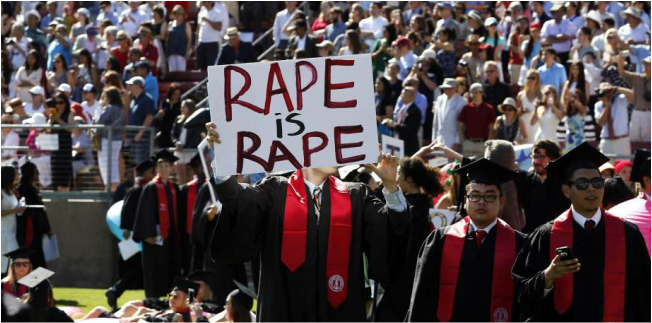|
After a year of demanding "trigger warnings" on lectures, videos and class materials, was it hypocritical to protest rape at graduation?
Last weekend's proceedings brought excitement, pride and controversy to Stanford's beautiful campus.
In addition to speaker Ken Burns spending about a quarter of his speech roasting Trump, which drew boos from some, several undergraduates protested the recent sentencing of a convicted Stanford rapist. Brock Turner was unanimously found guilty on three felony sexual assault charges... and handed a six-month sentence. You know -- because he's white and an athlete, and a longer punishment would "have a severe impact" on him. Don't get me wrong -- I am 100% disgusted by this sentence. I am 100% disgusted by the actions of rapist Brock Turner. Rape culture is clearly alive and well on college campuses, and male entitlement is dangerous to women everywhere. But. I can't help but ask, isn't this hypocritical? After a year of demanding sensitivity, safe spaces and trigger warnings, is it not problematic to turn graduation -- which is supposed to be a day of joy for graduates -- into a rape protest? After all, as the protestors themselves indicated by writing “1/3” atop their mortarboards to illustrate the ratio of Stanford students who will suffer a sexual assault by the time they graduate... many of the almost 2,000 graduating seniors are, themselves, survivors. All survivors respond differently to their assault. Some want their voice to be heard. Others want to avoid thinking about it at all costs -- anything that reminds them of the horrific event could ruin their day. Isn't the whole point of trigger warnings to help survivors avoid reliving a terrible memory? Was there a trigger warning on this commencement -- and should survivors who didn't want to be triggered have avoided the ceremony? Why is it acceptable for you to protest during commencement... but it's not okay for professors to discuss sexual assault in an academic environment without a trigger warning? I thought the entire point of the social justice movement was to be mindful of how your actions and words affect others. Which is why I wrote I Completely Support The Stanford Survivor -- But Can We PLEASE Stop Calling Her Brave? Calling this Jane Doe brave implies that other Jane Does, who didn't have two witnesses or medical reports or time, energy and resources to move forward with the prosecution, aren't. When you call this Jane Doe brave, there is a 20-30% chance that the person you're talking to is, herself, a survivor. And it could be absolutely demoralizing for her to hear that, in spite of the healing and progress she has made, you don't think she is brave. Bravery has nothing to do with it. It's not about "brave." It's about making the choice that is right for you. Likewise, might you protesting rape at graduation... ruin the event for many survivors? Serious question. Because I get why the protest is important, and I get why graduation is an opportunity to maximize your message's impact. But I also care about survivors. And I also think it's hypocritical to demand trigger warnings on your syllabus if you're going to protest rape at commenctment. Please share your thoughts in the comments.
0 Comments
Leave a Reply. |
About the Author

Eva is a content specialist with a passion for play, travel... and a little bit of girl power. Read more >
Want to support The Happy Talent? CLICK HERE!
Or Find me on Patreon!
What's Popular on The Happy Talent:
Trending in Dating and Relationships:
What's Popular in Science: Playfulness and Leisure Skills:
Popular in Psychology and Social Skills:
Categories
All
|



























 RSS Feed
RSS Feed